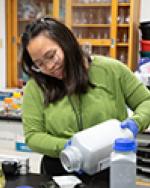
Don’t be afraid to ask questions and be proactive. It’s harder to go out there and change the world if we stay in our comfort zone.
Please give a brief, simplified overview of your research project.
In the Kemp lab, I work with lizard jaw fossils excavated from a Turks and Caicos island. Looking at the bone structure and shape, I analyze and categorize fossils for further analysis. The mandible and dentary fossils can be used to later estimate body size. Analyzing this data, we can investigate microevolution in lizards. In the Virtual Cures stream, I synthesize protein through wet lab. Working on tuberculosis and melioidosis, I transform genetic material with my target genes. Simultaneously, using high-performance screening, I virtually screen for potential inhibitors of my target protein. Growing up cultures and purifying the expressed protein, I can test my ligands against these enzymes. If successful, I can discover novel drug treatments for these infectious diseases.
Describe the tasks you engage in as part of your work.
In the Kemp lab, I analyze fossils for further analysis by looking at bone size, shape, and structure. Later steps include photographing and graphing the fossil data, we can later estimate body size and investigate microevolution in lizards. In the Virtual Cures stream, engage in both wet lab and virtual computing. Using Pymol, a molecular visualization system, as well as ligand docking systems GOLD and ICM, I screen libraries of ligands against my target protein. In the wet lab, I do a variety of techniques including transforming DNA, growing cultures, centrifuging samples, sonicating cells, purifying plasmid, running SDS page, agarose gels, and nickel or ion exchange protein purification.
Describe what you thought college might be like before you came to UT. Did you consider research when thinking about college?
Yes! I knew coming into college that I was pre-grad/research and that has not changed in my four years. I studied psychology, biology, chemistry, and mathematics/statistics with a focus on research at Doha College International School in the Middle East before college. I’ve gotten involved with research at various labs and projects at UT every semester of undergrad to explore my interests.
How did you get involved with your research project?
As a freshman, I signed up for every research and grad school mailing list at UT and went to various research mixers. I found out about this project by reading an email and I reached out to the PI about joining the class. It very much felt like a shot in the dark but he quickly responded and I got into the stream in a highly unconventional way. As an international student, I didn’t know about the Freshman Research Initiative (FRI) at UT and missed the application deadline. Through emailing the professor to get into an Experimental Learning Initiative (ELI) branch of the FRI, I got to continue on as an Accelerated Research Initiative (ARI) student. Similarly, I got connected to the Kemp lab by attending a research mixer at UT. I reached out to the PI, sent in my CV, and got an interview.
Do you see your project connecting with your plans for your future?
Definitely! I’m in two very diverse labs this semester and plan on continuing in both. I get to learn new techniques, master procedures, and network with professionals. It’s great preparation for what I want to do after graduating.
What is the most interesting or surprising thing you’ve gotten to do for this project?
Receiving a summer fellowship led to the best summer of my undergrad so far! I spent weeks in wet lab, from four to eight hours a day working with my team.

